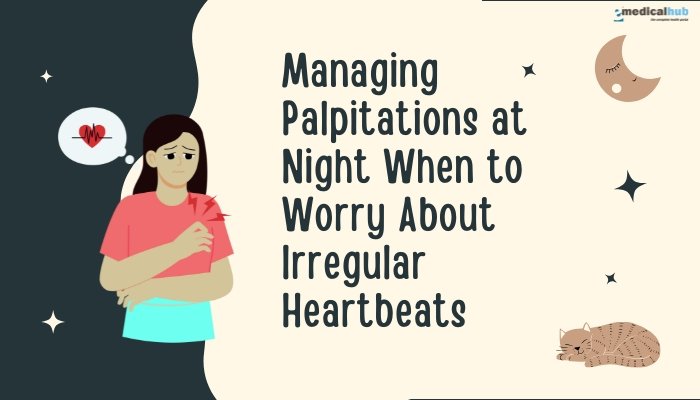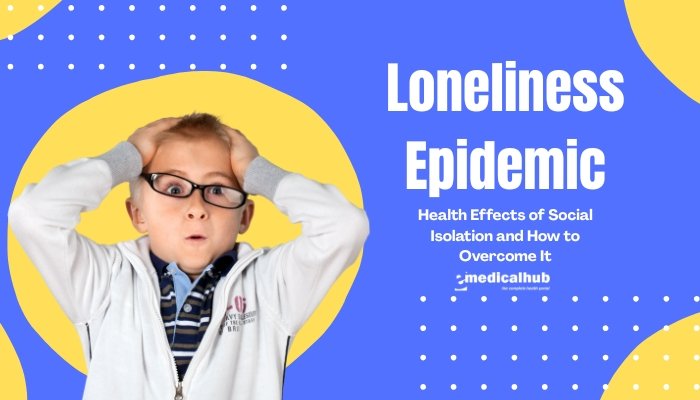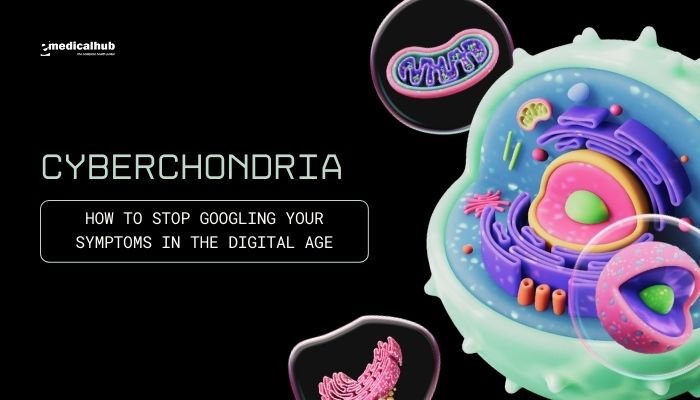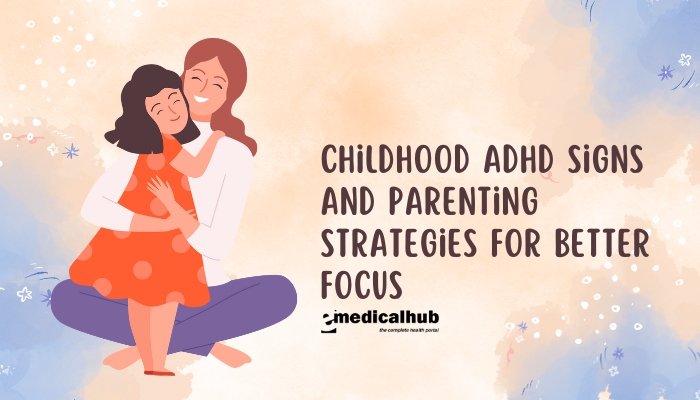Introduction
Heart palpitations can be described as a heightened awareness of the heartbeat. This sensation may feel like the heart is pounding, fluttering, or skipping beats. Although palpitations can happen at any time, some people notice them more often at night.
Waking up or trying to fall asleep when the heart is racing may cause fear and confusion. Most of the time, nighttime palpitations are not harmful. They often have simple explanations, such as stress or caffeine intake. However, certain patterns of irregular heartbeats should not be ignored.
This article explains the reasons why palpitations occur, focusing on why they might seem more noticeable at night. It will discuss warning signs that deserve medical evaluation, as well as practical steps to manage occasional palpitations.
The content uses straightforward terms to ensure clarity. Families, caregivers, and anyone experiencing nighttime palpitations can learn about possible causes, diagnostic approaches, and lifestyle changes to improve sleep and overall heart health. A references section at the end cites reliable medical sources using Vancouver style.
What Are Heart Palpitations?
A palpitation is an awareness of the heart beating that feels abnormal or uncomfortable. Some people describe it as a flutter, a skip, a thumping, or a rapid pulse. Although everyone occasionally feels their heartbeat, true palpitations can be unsettling and noticeable enough to draw attention away from normal activities. When they happen at night, they can disrupt sleep and create anxiety about heart problems.
Common Descriptions of Palpitations
- Flutters or Quivers: A light, shaky feeling in the chest
- Pounding or Thudding: A forceful heartbeat that can be felt through the chest or even the neck.
- Skipped Beats: A pause followed by an extra-strong beat.
- Racing: A rapid heartbeat that might match a fast pulse felt in the wrist.
Palpitations can happen in individuals with perfectly healthy hearts. They sometimes arise due to triggers like stress, caffeine, or certain medications. On the other hand, they can also indicate an underlying heart or medical condition that needs evaluation.
Why Palpitations Seem Worse at Night
Nighttime palpitations may feel more dramatic for a few reasons:
- Reduced Distractions
During the day, noises, conversations, and tasks occupy the mind. At night, in a quiet bedroom, any slight change in heart rhythm might be more noticeable. - Lying Down
Changing position from standing or sitting to lying down can shift blood flow. This change may make the heartbeat feel more pronounced. - Anxiety and Restlessness
It is common for worries to surface at night. Stress hormones can affect the autonomic nervous system, increasing awareness of the heart’s activity. - Digestive Factors
Eating a heavy or late meal may cause reflux or bloating. This can stimulate nerves that link the gut and heart, making palpitations more noticeable. - Stimulants Before Bed
Consuming caffeine, nicotine, or certain medications close to bedtime can elevate heart rate or cause sensations of an irregular rhythm.
A combination of these factors can intensify normal heartbeats or minor irregularities, transforming them into distracting nighttime palpitations. Understanding these triggers helps separate harmless causes from potentially serious ones.
Possible Causes of Nighttime Palpitations
Nighttime palpitations can stem from many sources, some related to lifestyle and others involving health conditions. While most episodes prove benign, repeated or severe palpitations warrant medical evaluation.
Stress, Anxiety, and Panic
Emotional stress or anxiety has a direct impact on heart rhythm. The body releases hormones like cortisol and adrenaline, designed to handle perceived threats. At night, unfinished tasks or concerns might lead to tension, fueling palpitations.
Signs
- Rapid breathing or hyperventilation
- Trouble sleeping due to racing thoughts
- Physical symptoms like sweating or trembling
Management Tips
- Relaxation techniques (e.g., deep breathing, meditation)
- Mental health counseling or therapy
- Consistent bedtime routine to reduce nighttime worry
Caffeine, Alcohol, and Other Stimulants
Caffeine, nicotine, and certain over-the-counter medications raise heart rate or cause restlessness. Alcohol can disrupt normal cardiac rhythm, especially if consumed close to bedtime. While some people tolerate moderate amounts, others might experience palpitations with even small doses.
Signs
- Palpitations or jitteriness after coffee, tea, energy drinks, or chocolate
- Sleeping difficulties or frequent awakenings
- Racing pulse after alcohol or smoking
Management Tips
- Restrict caffeine to morning or early afternoon
- Limit or avoid alcohol and nicotine
- Monitor reaction to cold medicines or diet pills with stimulants
Hormonal Changes
Fluctuations in hormones may heighten sensitivity to palpitations. Women can experience changes in their heartbeat during menstruation, pregnancy, or menopause. Thyroid disorders (hyperthyroidism, hypothyroidism) also affect heart rate.
Signs
- Irregular menstrual cycles, hot flashes, or night sweats in menopausal women
- Symptoms of hyperthyroidism (weight loss, heat intolerance) or hypothyroidism (weight gain, cold intolerance)
- Palpitations around ovulation or premenstrual period
Management Tips
- Discuss hormone levels and potential treatments with a healthcare provider
- Track palpitations in a diary to spot hormonal patterns
- Seek regular thyroid function tests if thyroid disease is suspected
Arrhythmias
Arrhythmias are irregular heart rhythms that happen when the electrical signals coordinating the heartbeat malfunction. Common arrhythmias include atrial fibrillation, supraventricular tachycardia (SVT), and premature beats. Some arrhythmias remain harmless, while others increase stroke risk or may weaken the heart over time.
Signs
- Sudden fast or irregular heartbeat lasting from seconds to hours
- Dizziness or near-fainting during episodes
- Occasional chest discomfort or shortness of breath
Management Tips
- An electrocardiogram (ECG) can capture abnormal rhythms
- Ambulatory monitoring devices (Holter or event monitors) for repeated episodes
- Medications or procedures like ablation for more serious arrhythmias
Underlying Heart Disease
Coronary artery disease or valve problems can sometimes present as palpitations, though chest pain and reduced exercise capacity are common signs. Sleep disturbances, including palpitations at night, may be an early clue.
Signs
- Worsening exercise tolerance
- Pressure or discomfort in the chest
- Breathlessness, especially when lying flat
Management Tips
- Seek evaluation for heart disease risk factors (blood pressure, cholesterol
- Stress testing and imaging to detect structural or blood flow issues
- Properly manage risk factors (hypertension, diabetes, high cholesterol)
Sleep Apnea
Obstructive sleep apnea involves repeated pauses in breathing during sleep. This can cause surges in adrenaline and brief awakenings, raising heart rate and often leading to palpitations.
Signs
- Loud snoring or gasping for air at night
- Daytime fatigue or difficulty concentrating
- Morning headaches or dry mouth
Management Tips
- Overnight sleep study (polysomnography) to confirm diagnosis
- Use of continuous positive airway pressure (CPAP) machines
- Weight loss, avoiding sedatives, and side-sleeping to reduce airway obstruction
Low Blood Sugar (Hypoglycemia)
When blood sugar dips, especially overnight in people with diabetes on certain medications, the body responds by releasing adrenaline. This can produce palpitations, sweating, and shaking.
Signs
- Waking at night with heart pounding, possibly feeling dizzy or weak
- Improvement after eating or drinking something sugary
- History of diabetes or frequent episodes of low blood sugar
Management Tips
- Adjust diabetes medication doses or timing
- Keep a small snack by the bed for symptomatic relief
- Monitor blood glucose more frequently
When to Worry: Warning Signs
While palpitations can be harmless, some features indicate a more urgent need for medical attention. Seek advice if palpitations:
- Occur with Chest Pain or Pressure
Could suggest reduced blood supply to the heart muscle (ischemia). - Cause Fainting or Dizziness
May mean the heart is not pumping effectively, risking reduced blood flow to the brain. - Happen Along with Marked Shortness of Breath
Possibly an arrhythmia or heart failure sign. - Last for a Long Time (More than a Few Minutes)
Persistent fast or irregular rhythms need evaluation. - Appear with Risk Factors for Heart Disease
Individuals with high blood pressure, high cholesterol, or diabetes should have a low threshold for seeking help.
If there is ever a concern that symptoms could be a heart attack—especially with intense chest discomfort, sweating, or nausea—call emergency services right away.
Steps to Diagnose Nighttime Palpitations
- Detailed Medical History
A healthcare provider will ask about the nature of palpitations, timing, triggers, and any coexisting symptoms. Family history of heart disease or arrhythmias is also relevant. - Physical Examination
Checking for signs such as irregular pulse, heart murmurs, thyroid gland enlargement, or abnormal blood pressure. - Electrocardiogram (ECG)
A quick and painless test of the heart’s electrical activity. It can detect ongoing arrhythmias but may miss intermittent episodes. - Holter or Event Monitor
Portable devices that record heart rhythm for 24 hours (Holter) or up to 30 days (event monitor). Patients press a button to record events when symptoms appear. - Echocardiogram
Ultrasound-based imaging to check heart structure and valves. This helps detect any physical abnormalities contributing to palpitations. - Electrophysiological Study
In-depth evaluation of the heart’s electrical pathways, sometimes recommended for unexplained arrhythmias. - Blood Tests
Measuring thyroid function, electrolytes, hemoglobin, and possibly checking for markers of heart strain. - Stress Test
Treadmill or bicycle exercise while heart activity is monitored, to detect exercise-induced arrhythmias or ischemia.
These investigations help pinpoint whether the palpitations are benign or signal something more serious.
Managing Palpitations Through Lifestyle
Relaxation and Stress Management
- Deep Breathing Exercises: Slowing the breath can reduce the sympathetic nervous system’s effect on heart rate.
- Meditation or Guided Imagery: Calming the mind before bed lowers cortisol and adrenaline.
- Progressive Muscle Relaxation: Tensing and releasing muscles reduces tension across the body.
Sleep Hygiene
- Regular Bedtime: Aim for the same sleep and wake times daily, reinforcing circadian rhythm.
- Quiet, Dark, Cool Room: Minimizing external stimuli supports deeper sleep.
- Limit Screen Use: Blue light from phones or tablets can disrupt melatonin production.
- Avoid Large Meals and Caffeine Late: Give the body time to digest. Switch to herbal teas instead of coffee in the evening.
Balanced Diet and Hydration
- Reduce Sugary Foods: High sugar intake can spike insulin and adrenaline surges.
- Increase Fruits, Vegetables, and Whole Grains: Nutrient-rich foods help stabilize energy levels.
- Moderate Sodium: High salt consumption can elevate blood pressure and heart workload.
- Drink Enough Water: Dehydration can occasionally cause palpitations, especially in hot weather or with exercise.
Exercise and Weight Management
Regular moderate exercise strengthens the cardiovascular system. Activities like brisk walking, swimming, or cycling a few times a week improve heart efficiency. Maintaining healthy body weight reduces strain on the heart and lowers risk factors that cause palpitations.
Substances to Limit
- Caffeine: Found in coffee, tea, sodas, energy drinks, and chocolate. If sensitive, limit to morning only.
- Alcohol: Can disrupt normal rhythms and fragment sleep.
- Nicotine: A stimulant that speeds up the heart rate. Quitting smoking improves heart health.
- Illegal Drugs: Amphetamines or cocaine can cause dangerous arrhythmias.
Medical Treatments for Frequent or Concerning Palpitations
If lifestyle modifications do not resolve bothersome or risky palpitations, a healthcare provider may suggest additional steps:
Beta-Blockers
Drugs such as metoprolol or propranolol slow heart rate and reduce the force of contractions. They can relieve symptoms of palpitations and calm the fight-or-flight response.
Calcium Channel Blockers
Medications like diltiazem or verapamil relax blood vessels and sometimes slow heart conduction. They help in arrhythmias like supraventricular tachycardia.
Antiarrhythmic Drugs
In certain complex cases, drugs that directly modify cardiac electrical activity are prescribed, such as flecainide or amiodarone. These carry more potential side effects and require careful monitoring.
Ablation Procedures
For specific arrhythmias (e.g., atrial fibrillation or SVT), an electrophysiologist may perform a catheter ablation. This procedure pinpoints and destroys abnormal pathways in the heart to stop irregular beats.
Devices (Pacemakers or ICDs)
Serious heart conduction problems might necessitate a pacemaker for consistent rhythm or an implantable cardioverter-defibrillator (ICD) to prevent life-threatening arrhythmias.
Anxiety and Psychotherapy
If anxiety disorders drive nighttime palpitations, referral to mental health specialists for cognitive-behavioral therapy or anxiolytic medications may help. Sometimes, treating anxiety or panic reduces heart palpitations more effectively than focusing solely on the heart.
Coping Techniques for Nighttime Episodes
Even with medical evaluation and lifestyle changes, occasional episodes may still occur. Having a plan helps reduce panic and shorten the duration of palpitations.
- Stay Calm
Remind yourself that most palpitations are not dangerous. Panic can escalate heart rate. - Deep, Slow Breathing
Inhale through the nose for a count of four, hold for a moment, then exhale slowly through the mouth for a count of four to six. - Vagal Maneuvers
For certain arrhythmias, coughing or performing the Valsalva maneuver (bearing down gently as if having a bowel movement) can help reset the rhythm. Do this under medical advice. - Change Position
Sometimes sitting up or lying on one’s side can relieve the sensation of pounding. - Splash Cold Water on the Face
A mild shock of cold can engage the diving reflex, which may slow a racing heart. - Focus on Something Relaxing
Listen to calming music, practice mental imagery, or read a gentle topic to shift attention away from the heartbeat.
Keep track of the frequency, duration, and triggers of these episodes. A log helps doctors tailor advice and measure improvement over time.
Potential Misdiagnoses and Overlooked Issues
Palpitations sometimes overlap with other conditions. In busy clinical settings, a quick check might yield an incomplete explanation. For instance, a doctor might attribute irregular heartbeats solely to anxiety without exploring possible arrhythmias or thyroid issues. Alternatively, a focus on heart disease might miss the role of panic attacks or side effects of medication.
Hidden Triggers
- Nutritional Deficiencies: Low magnesium or potassium can promote premature beats.
- Allergies or Asthma: Some inhalers or decongestants raise heart rate.
- Menopause: Hormonal fluctuations can mimic anxiety or panic disorders.
- Medication Interactions: Combining certain prescriptions or over-the-counter substances can intensify palpitations.
Open communication with a healthcare provider is key. Patients should mention all medications, dietary supplements, and emotional stressors to get a well-rounded evaluation.
Myths and Facts
- Myth: All palpitations mean heart disease.
Fact: Many episodes are triggered by stress, caffeine, or benign arrhythmias. - Myth: Nighttime palpitations always require medication.
Fact: Lifestyle changes and identifying triggers can often ease symptoms without drugs. - Myth: If an ECG is normal, the heart is fine.
Fact: Intermittent arrhythmias may not appear during a short ECG. Extended monitoring might be needed. - Myth: Women’s palpitations are usually “just anxiety.”
Fact: While anxiety plays a role, women also have unique heart risks and hormones that merit proper evaluation. - Myth: Stimulants are the only cause of palpitations.
Fact: While common, many other medical and hormonal issues can trigger episodes.
Table: Common Nighttime Palpitations Triggers and Possible Solutions
| Trigger | Possible Reason | Management |
| Late-night coffee or tea | Caffeine stimulates heart rate | Switch to herbal tea or decaf earlier in the day |
| Chronic stress or anxiety | High adrenaline levels at bedtime | Practice relaxation, therapy, or guided mindfulness |
| Alcohol before bed | Interferes with rhythm and sleep | Limit or avoid alcohol near bedtime |
| Eating a large meal late | Digestive load can trigger vagal reactions | Choose lighter meals in the evening |
| Lying flat immediately after a meal | Possible acid reflux irritating the esophagus | Wait 2–3 hours after eating before lying down |
| Uncontrolled thyroid issue | Excessive thyroid hormones speed metabolism | Thyroid function tests, medication adjustment |
| Menopause or hormonal fluctuation | Changing hormone levels can affect heart’s signals | Medical review, hormone therapy if appropriate |
| Low blood sugar in diabetics | Body releases adrenaline in response to hypoglycemia | Adjust diabetes medications, keep a small snack handy |
| Sleep apnea episodes | Breathing interruptions cause adrenaline surges | Sleep study, possible use of CPAP |
Emotional Impact and Support
Recurrent nighttime palpitations can disrupt quality of life. Constant worry about the next episode may create a cycle of anxiety that perpetuates the problem. Encouragement and understanding from family and friends help reduce stress. Some people also benefit from support groups, either in person or online, to share coping strategies.
Professional help from counselors or psychologists can be pivotal. Cognitive-behavioral therapy (CBT) specifically targets anxious thoughts and behaviors, giving individuals tools to manage fear and let go of worries that spike adrenaline at night.
Tips for Improving Sleep Quality
- Create a Wind-Down Routine
Spend 20–30 minutes before bed doing calming activities like reading or gentle stretching. - Limit Screen Light
Turn off electronic devices or use night-mode filters at least 1 hour before bedtime. - Maintain a Sleep-Friendly Environment
Keep the bedroom at a comfortable temperature, reduce external light, and consider white noise machines if needed. - Avoid Overthinking
If the mind is racing, jot down worries or next-day tasks on a notepad. Plan to revisit them during the day, not at night. - Use Relaxation Apps
Guided meditations or soft music can lessen mental chatter and center breathing.
Frequently Asked Questions
Can dehydration cause palpitations at night?
Yes. Low fluid levels may affect electrolyte balance and strain the cardiovascular system, occasionally triggering palpitations.
Should I worry if I only get a few extra beats now and then?
Occasional premature beats (extrasystoles) can be normal, but check with a healthcare professional if they increase in frequency or cause distress.
Are nighttime palpitations more common in women?
Women might be more prone to notice or report them due to hormonal fluctuations and possible stress factors. However, men also experience nighttime palpitations.
If my ECG is normal, can I ignore further testing?
It depends. If symptoms continue, a longer monitoring period (Holter or event monitor) may be needed to catch intermittent arrhythmias.
How does obesity contribute to palpitations?
Excess weight can strain the heart and lungs, raising the risk of conditions like sleep apnea that lead to irregular heartbeats.
Conclusion
Nighttime palpitations range from harmless “extra beats” to more concerning irregular heart rhythms. Factors like anxiety, stimulants, or lying down soon after meals often cause benign episodes. Still, some arrhythmias or underlying medical conditions require proper diagnosis and treatment. Paying attention to the frequency, duration, and associated symptoms can guide whether medical evaluation is necessary.
Lifestyle management offers significant relief for many people. Adjusting caffeine intake, managing stress, creating a calming bedtime routine, and seeking help for anxiety can reduce both the intensity and frequency of palpitations. For episodes that persist or involve worrisome signs—like chest pain, fainting, or breathlessness—it is important to consult a healthcare provider. Evaluations such as ECGs, Holter monitoring, and blood tests can rule out serious causes. In some cases, medications or procedures address troublesome arrhythmias or other cardiac issues.
Ultimately, understanding one’s own triggers and physical cues promotes better control over nighttime palpitations. By embracing balanced habits and maintaining open communication with healthcare professionals, individuals can find the best ways to sleep more soundly and worry less about irregular heartbeats at night.
References
- Gillinov AM, Etiwy M, Wang R, et al. Variable accuracy of wearable heart rate monitors during aerobic exercise. Med Sci Sports Exerc. 2017;49(8):1697-703.
- Ng GA. Treating patients with palpitations and apparent normal heart. Heart. 2019;105(7):586-94.
- Zimetbaum P. Palpitations. N Engl J Med. 2016;374(16):1534-42.
- Pratt CM, Dolan B, Rangel G, et al. Cardiac monitoring in individuals with palpitations. Am J Cardiol. 2018;121(2):213-20.
- Katritsis DG, Boriani G, Cosío FG, et al. Arrhythmias in the 21st century. Europace. 2018;20(7):1102-3.
- Hasan S, Dikun O, Couper E. Evaluation of patients with palpitations. BMJ. 2020;371:m4083.
- Freedman B, Camm J. Diagnosis of atrial fibrillation using long-term monitoring. Nat Rev Cardiol. 2017;14(5):297-8.
- Thomas RJ, Beatty AL, Beckie TM, et al. Home-based cardiac rehabilitation: A scientific statement from the American Association of Cardiovascular and Pulmonary Rehabilitation, and the American Heart Association. Circulation. 2019;140(1):e69-e89.
- Chen LY, Chung MK, Allen LA, et al. Atrial fibrillation burden: Moving beyond atrial fibrillation as a binary entity. Circulation. 2018;137(20):2091-102.
- Fuster V, Ryden LE, Cannom DS, et al. Management of patients with atrial fibrillation. Circulation. 2006;114(7):e257-354.
- Nguyen JL, Reinke CE, Liu SY, et al. The association of sleep duration and sleep patterns with type 2 diabetes in older adult men and women. BMJ Open Diabetes Res Care. 2019;7(1):e000664.
- Lip GY, Diener HC, Soliman EZ, et al. Atrial fibrillation and insomnia: associations, consequences, and possible management. Nat Sci Sleep. 2020;12:1-15.






